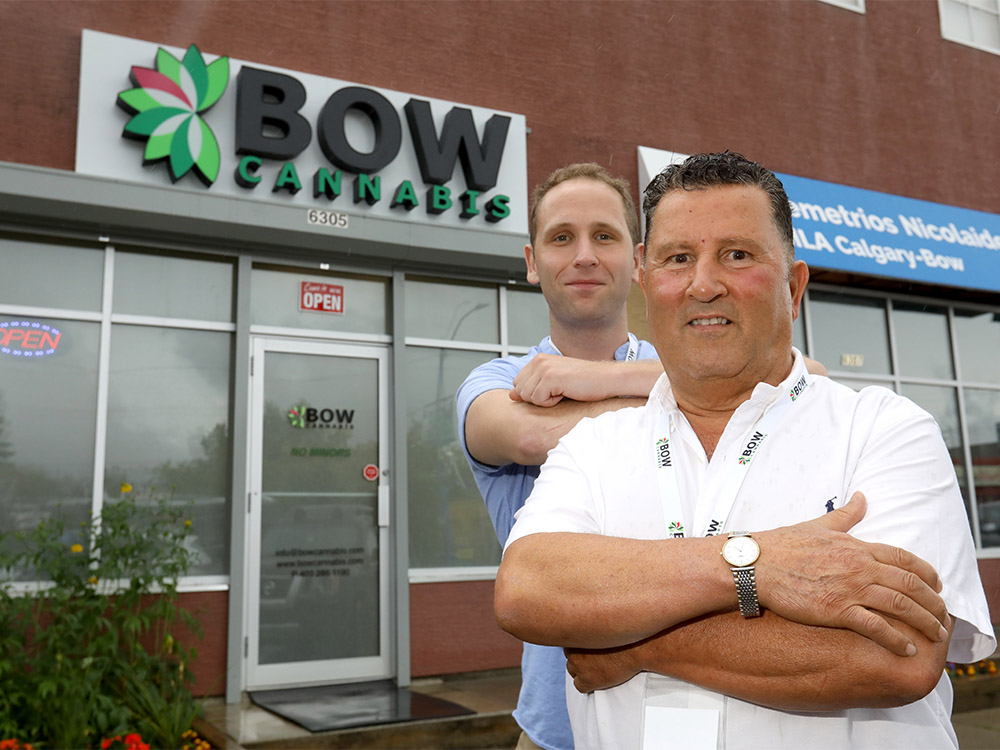You are here
Home 🌿 Marijuana Politics 🌿 Cannabis store robberies in Alberta prompt retailers to remove legislated window coverings 🌿Cannabis store robberies in Alberta prompt retailers to remove legislated window coverings

A series of cannabis store robberies in Alberta has led some retailers to tear down window coverings initially erected to satisfy federal legislation.
Those visual obstructions were meant to adhere to the Cannabis Act to keep cannabis products and accessories out of the view of minors.
But retailer Nathan Mison said those window coverings compromise the safety of staff by making it easier for robbers to commit their crimes.
“We’ve made ourselves a target by making it so someone can come in, lock the door and take all the time they want robbing a store because no one can see in,” said Mison, spokesman for the Edmonton-based Fire and Flower Cannabis chain.
“Nobody should be in jeopardy at their work.”
One of the Fire and Flower stores in Edmonton was the site of an armed robbery about two weeks ago in which cannabis product was taken.
It’s one of several such heists in the province since a Cannamart store in Edmonton was held up and merchandise stolen in December, the first reported robbery of a cannabis retailer in Alberta since legalization took effect in October 2018.
Mison, chairman of the Alberta Cannabis Council, said he’s not aware of any Calgary stores being robbed.
But he said his chain’s six outlets in the city will be reviewed for removing or reducing window obstructions, a practice that’s met no resistance from federal or provincial regulators.
That’s because those retailers are taking pains to ensure merchandise and labelling remains obscured, such as by shifting or covering displays, using transparent window films and other means, said Mison.
“They completely understand as long as we’re adhering to the legislation,” he said, adding the layout of some stores may mean window coverings will remain.
Mison said the push for greater physical visibility for cannabis shops will be picked up nationally, partly because Fire and Flower has stores in four provinces and also due to robberies in other provinces.

Nathan Mison of Fire and Flower Canabis Co. on the first day of legalized cannabis in Edmonton, Oct. 16, 2018.
Regulations governing the Alberta industry don’t actually call for the complete blackout of store windows, just an assurance minors can’t see cannabis or accessories, Alberta Gaming, Liquor and Cannabis spokeswoman Heather Holmen said in an email.
“AGLC is aware that some retailers who have chosen to utilize window coverings as part of their business design are concerned that the coverings create safety issues,” she said.
“Retailers do have other options to keep products out of sight of youth and still comply with legislation and policy.”
She said the AGLC is reviewing the issue with Health Canada and business owners to “find a solution that meets policy requirements while ensuring staff and consumer safety.”
The federal regulator echoed the AGLC, saying retailers have options in how they meet the legislation.
“Health Canada understands there are solutions retail stores may implement in order to restrict visibility of cannabis and related packaging and promotions in the store, without restricting full visibility into the store,” said spokeswoman Marie-Pier Burelle.
Jim Ramadan said when he opened his Bow Cannabis store last year, AGLC officials “were fanatical about having every inch of window covered.”
He said he’d like to remove some of the coverings on his store, adding the entire premise of obscuring them “is farcical.”
“You can’t see the cannabis anyway,” said Ramadan.
And he said blacking out storefronts furthers the stigma of the industry and the product it sells when one of the main reasons for legalization is to undermine the black market.
“You make it look mysterious and dark, it’s a bad thing,” said Ramadan.
Mison agreed.
“It entrenches the stereotype that this is something we have to cover up when we have a legal market selling a legal product,” he said.
Changes to that aspect, he said, can be viewed as part of a longer-term relaxation of regulations many in the business are hoping for or expect as the industry becomes more entrenched.
Many of those policies are considered a competitive burden by retailers who face a flourishing black market.
“We’re looking at things like lower excise taxes, packaging, marketing capabilities,” said Mison.
420 Intel is Your Source for Marijuana News
420 Intel Canada is your leading news source for the Canadian cannabis industry. Get the latest updates on Canadian cannabis stocks and developments on how Canada continues to be a major player in the worldwide recreational and medical cannabis industry.
420 Intel Canada is the Canadian Industry news outlet that will keep you updated on how these Canadian developments in recreational and medical marijuana will impact the country and the world. Our commitment is to bring you the most important cannabis news stories from across Canada every day of the week.
Marijuana industry news is a constant endeavor with new developments each day. For marijuana news across the True North, 420 Intel Canada promises to bring you quality, Canadian, cannabis industry news.
You can get 420 Intel news delivered directly to your inbox by signing up for our daily marijuana news, ensuring you’re always kept up to date on the ever-changing cannabis industry. To stay even better informed about marijuana legalization news follow us on Twitter, Facebook and LinkedIn.




